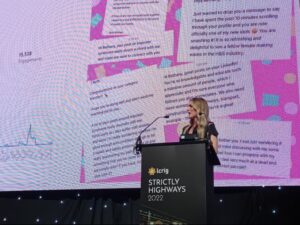Empowering women through personal branding
The theme for 2024’s International Women’s Day (today) is Inspire Inclusion, showcasing the importance of self-advocacy for women in the sector. Where women are still pushing for representation across industries, the significance of self-promotion and personal branding cannot be overstated.
Here, Beth Holroyd, delves into the balance between self-advocacy and strategic brand building.

Beth Holroyd
In the competitive landscape of professional growth, the line between ‘blowing your own trumpet’ and brand building can often become blurry. The truth is, advocating for yourself is not only acceptable (shock!) but crucial for career advancement. After all, if you don’t champion your own achievements, who will?
The first step is acknowledging that self-advocacy is not wrong or taboo. I had a conversation recently about this with other industry professionals – we were talking about self-nomination for awards, and how this should be encouraged – nobody knows how great you are at what you do better than you!
Expecting others to be more invested in your professional journey than you are is a recipe for disappointment, and we should all fully embrace the role of being your own cheerleader.
My own experiences have provided me the opportunity to talk with so many people, and I love when I’m talking to someone and you can see the fire in them when they talk about something they’re passionate about.
Share your passions, talk about what drives you, and highlight your contributions to successful projects. Positive feedback from colleagues, clients, or industry peers should not be kept in the shadows.
A well-crafted personal brand enhances your professional reputation, opening doors and opportunities that extend beyond the scope of your immediate role. It positions you as a thought leader and influencer in your industry. Personal branding isn’t just a tool for individual advancement but as a catalyst for inclusive leadership and representation.
Though it’s a self-promotion paradox… particularly for those of that wrestle with imposter syndrome daily!
So what is a personal brand?
It’s more than just a buzzword you see scattered across LinkedIn; it’s your professional identity, your reputation, and how you’re perceived in the industry. Your personal brand goes beyond the work you deliver; it’s about how you make others feel.
Building your personal brand and professional network is, in my opinion, just as important as the quality of work you produce.
Authenticity is key

Beth speaking at Safety and Health Expo 2023.
Nobody likes to see an AI-generated article or post online – whilst I’m sure we all agree AI is incredibly useful – and can be used to help you set out what you want to say – it shouldn’t be just a copy and paste job.
Those of us who write regularly have a unique style. I once had a colleague say to me ‘I read your articles in your voice, as though it’s you reading it to me’. They didn’t know this at the time, but it meant so much to me.
I know that being authentic doesn’t always come naturally, especially for individuals in minority groups navigating spaces dominated by majority perspectives, whether due to gender (e.g females working in male-dominated fields), ethnicity, LGBTQ+ identity, or disabilities. The temptation to “mask” and conform to the prevailing norms can be strong, hindering the development of a genuine personal brand – the reason you were hired was not to assimilate – you will have a unique perspective and that is your superpower.
Diversity isn’t a hindrance – it’s a superpower!
What do you want to be known for?
Whether it’s being an advocate for apprenticeships or championing women in STEM careers, your personal brand should extend beyond your immediate professional role. My career is so important to me, it’s a huge part of who I am.
My day-to-day roles have varied, but my passion for STEM and diversity has remained. I’m often tagged in posts on LinkedIn by my peers about topics they know I would care about, this means that people recognise me as someone who is passionate about those particular areas – for me this is often tackling skill shortage, apprenticeships and the world of health and safety.
Ask yourself…
Reflect on the three words you’d want people to use when describing you. Are these the words you’d choose for yourself? Aligning people’s perception with your intention is a crucial aspect of personal brand management.
Think about and define your audience—be it the wider construction industry, professional institutions, or education providers, who do you want to ‘speak’ to. Who will your words resonate with?
So, what can you do?
 Posting regularly and being consistent online not only keeps you visible but also helps connect your content with the right audience. Share your insights, industry news you want to talk about, and snippets of your professional journey.
Posting regularly and being consistent online not only keeps you visible but also helps connect your content with the right audience. Share your insights, industry news you want to talk about, and snippets of your professional journey.
Share photos too! My posts on LinkedIn with photos always create more engagement – people like to ‘see’ what you’ve been up to as well. My photos show me getting up to all sorts whether that be delivering a H&S stand down, attending a conference or sharing a positive story.
- Define a narrative that aligns with your professional goals. Share stories that reflect your values, passions, and expertise. This narrative should resonate with your target audience.
I’ve always been really particular about what content I will and won’t share on my Linkedin. I’ve had brands and businesses reach out to work with me and I’ve turned people down when I didn’t think it aligned with my passions and what I like to share.
- Building an online presence is not just about broadcasting your achievements it’s about engaging authentically with your audience. Respond to comments, participate in discussions, and showcase the human side of your professional persona.
I regularly work with businesses and professional institutions to write articles, speak at events and to create content about topics that I am passionate about within the spaces they operate in.
- Consider who you’re accepting into your network – don’t just accept everyone and anyone. Engagement is really important; you want to build a network of people who will interact and support you.
- Diversify your online presence by utilising multiple platforms. LinkedIn is a powerful tool for professional networking, but don’t underestimate the impact of other platforms such as X/Twitter, Instagram, or even a personal blog.
- Showcase your commitment to professional growth. Share articles, attend webinars, and highlight any certifications or courses you undertake. This not only demonstrates your expertise but also positions you as a continuous learner in your field.
Whilst self-advocacy applies to everyone, I hope to empower more women to embrace self-promotion, develop their authenticity, and use their voices. Be the change you want to see, and inspire others to do the same which will encourage the industry to become a more inclusive environment for those who follow in our footsteps.
Empowering women through personal branding
For International Women's Day, Beth Holroyd delves into the balance between self-advocacy and strategic brand building.
Beth Holroyd
SHP - Health and Safety News, Legislation, PPE, CPD and Resources Related Topics
Beth Holroyd: ‘PPE that’s not designed with women in mind is a fundamental problem’
Recruit to retain
Moving forward



 Posting regularly and being consistent online not only keeps you visible but also helps connect your content with the right audience. Share your insights, industry news you want to talk about, and snippets of your professional journey.
Posting regularly and being consistent online not only keeps you visible but also helps connect your content with the right audience. Share your insights, industry news you want to talk about, and snippets of your professional journey.